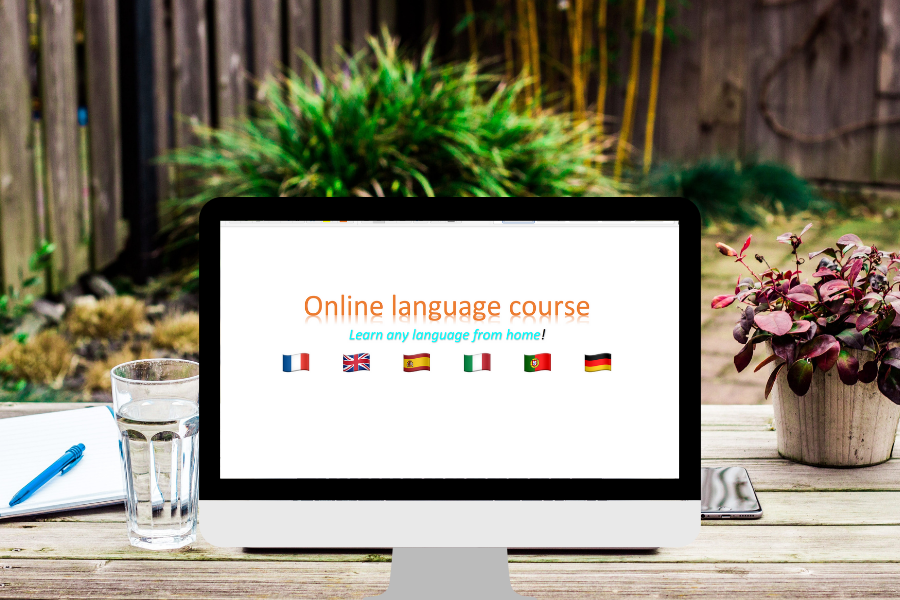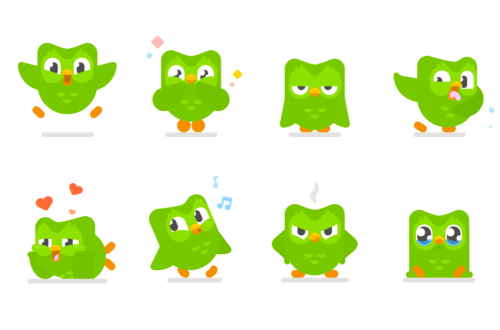
How I Learn Foreign Languages On My Own
Broadening my horizons, traveling, discovering other cultures, communicating with people from elsewhere. Here are some of the reasons that pushed me to learn and improve foreign languages, beyond the language courses I took during my schooling. Thus, I am perfecting my English and Spanish, and I am starting to learn Italian and Arabic. I’m going to explain to you the learning methods and tricks I use to learn languages on my own.
Have a real motivation
First of all, it is crucial to have a real motivation to learn a foreign language, especially when learning it on your own. It is not about learning it just because “it will look good on your CV” for example. No, it has to come from the heart, with a deep motivation. It can be a particular attraction for a language and a culture, a foreign love partner, the dream of traveling to certain countries (for example, learning English to discover the United States, Spanish for Central and Latin America…), moving abroad…

Motivation is to be maintained throughout the learning process. It is what will allow you to keep the learning schedule you have set for yourself.
Thus, it is important to have a specific goal, not a vague one such as “I want to speak French”, but rather “I want to get by on my next trip abroad”, “I want to reach the B1 level to hold a conversation with my Spanish friends”, etc.
Then, breaking down your goal into smaller intermediate objectives allows you to progress step by step without getting discouraged.
Organize your learning
Organizing your foreign language learning will help you to move towards your goal. I think it’s better to learn a little bit every day, or at least every two days, rather than doing a big session once a week. This method allows me to create a learning habit and stay focused throughout each session. It is easier to stay focused for twenty minutes than for two hours straight. Thus, learning will be more effective. Furthermore, if you study for twenty minutes a day for six days, you will have studied for a total of two hours.
In addition, I recommend varying the activities from day to day, in order to work on the different aspects of the language and not to get bored (for example: listening on Monday, reading on Tuesday, etc.).
Depending on your schedule, try to plan times of the day when you are the most alert (you can include this time in your agenda or to-do list).
Finally, as we have seen before, I advise you to set goals to keep yourself motivated and to reward yourself when you reach them (for example: buy a book or magazine you are interested in – in the target language -, go to a country where the target language is spoken on your next vacation, etc).

Immersion
I think it is important to immerse yourself in the foreign language you are learning from the beginning. For example, listen to the radio even if you don’t understand much or even anything at all. This will allow you to get used to the sounds of the target language (passive immersion).
Similarly, reading words or newspaper headlines will help you get used to the language. If you are lucky enough to travel or live in the country where the language is spoken, walking down the street and shopping while reading the words you encounter is ideal for learning vocabulary in context, without even realizing it.
You can learn vocabulary by listening as well as reading, by deducing the meaning from the context, especially if the target language is close to yours. I advise you to check the vocabulary in the dictionary because some words can be false friends.
Immersion allows you to pick up vocabulary and grammar points when you really feel the need to, and therefore to remember them more easily.
However, a little clarification: living in the country where the target language is spoken can greatly help you, but it will not be enough if you do not actively immerse yourself, i.e. if you adopt the posture of a learner who is going to look for and memorize the elements of the language he/she encounters.

My favorite resources
I advise you not to multiply them endlessly, at the risk of getting lost. There is no point in buying 10 different books. You can choose either a classic textbook or an intuitive method such as Assimil, Harrap’s or Berlitz, depending on what suits you best.
Use mostly resources designed for learners at the beginning (language methods, Youtube videos and podcasts for learners…), then as you progress, use more and more authentic resources, i.e. designed for native speakers (news, novels and non-fiction books, movies…).
Here are some resources you can use:
- Dictionaries, both paper and online, such as Larousse for the French speakers or to learn French, Wordreference, Oxford, Cambridge, Reverso, Linguee… You can use not only translation dictionaries but also definition dictionaries in the target language if you have an intermediate or advanced level, as this allows you to understand without having to translate.
- Lexilogos, a dictionary that also offers keyboards in other languages, such as Arabic.
- Bilingual books like those from Penguin readers.
- Resources for children, as they use simple vocabulary.
- Conversation guides, printed or online.
- Resources for native speakers: news websites, YouTube channels, TV, radio, books you like (it’s important)…
- Applications such as Duolingo (which uses the streak that represents the number of consecutive days you have been using the app to learn, interesting to stay motivated), MosaLingua, Babbel. Although they are fun and practical, they are not enough if they are used alone. You need to combine different learning tools and resources.
- Instagram accounts made for learners and accounts for natives on topics you are interested in: you can read posts, even listen to IGTVs, write comments under posts…
- For language learning in general: The MezzofantiGuild, Fluent in 3 months, I will teach you a language among others.
Learn vocabulary
Use Pareto’s law, or the “80-20 principle”, according to which 20% of your efforts will give you 80% of your results. That means that if you focus, at least in the beginning, on the most used vocabulary (the 20%), you will be able to cope with many different situations (the 80%).
You can, like me, learn with mnemonic tricks. The funnier or more offbeat they are, the better. For example, “friend” in Arabic is صَديق (pronounced “SadiiK”, with deeper “s” and “k” than in English), which made me think of “sadistic” in English. Is a sadistic friend really a friend?
I would also advise you to learn not only words but also sentence structures and turns of phrase to speak like native speakers. The idea is not to line up the words you learn by reproducing the sentence structures you know in your native language. Each language reflects its own way of thinking and seeing the world, which is translated into unique sentence structures.
Once you have learned the basic vocabulary, it is worthwhile to look for vocabulary that you specifically need for your intended use of the language (e.g., traveling, living in the country, working in a specific professional field, knowing how to talk about a passion such as painting, soccer, gardening, etc.). One of the advantages of self-study is that you can personalize your learning.
For each language I learn, I keep a vocabulary notebook where I gather useful words collected from my activities in the target language. I have paper notebooks, but you can also use a digital notebook or even an application. In paper format, you can choose to write down the words in chronological order of learning (simple notebook) or alphabetically (directory notebook), depending on your preference.
In order to strengthen your learning, the method of spaced repetition has proven itself. It is based on the observation that at some point the brain will forget what has been learned. In order to avoid this, you must revise at regular intervals, more or less spaced. You can use a spaced repetition software or application like MosaLingua.

Learn grammar
Learning grammar is essential to form grammatically correct sentences. I recommend that you learn it along the way, and not in a binge way that can lead to “cramming”.
Consult your textbook or grammar book when you want to clarify a specific point. By looking up the grammar you need, you will remember it even better.
Practice while having fun
If you need to acquire “theoretical” knowledge related to vocabulary and grammar, this is not enough to “speak” a foreign language, i.e. to be able to use it in your everyday life. Practice the language! Do it while having fun, because otherwise your brain will associate the target language with something boring and you will risk making less progress or even giving up.
Get over your perfectionism and practice what you’ve just learned, even at a beginner level. Get out of your comfort zone. Don’t wait until you’re at a higher level to start. Don’t be afraid to make mistakes, they will help you to learn, just like when you were a kid. As the proverb says, practice makes perfect.
Practice the four language skills: listening, reading, writing, speaking.
Listening comprehension: listening
Listening gets your ear used to the language. If it is difficult to understand at first, don’t be discouraged: the more you listen, the more you will progress and understand things.
There is no shortage of resources, especially online: radio, television, series and films in their original version, Youtube videos, podcasts, songs…
Reading comprehension: reading
Reading will allow you to enrich your vocabulary, acquire sentence structures and turns of phrase specific to the target language, while cultivating and entertaining you. Read about topics you are interested in.
One of my tricks is to set my electronic devices, such as my cell phone, in the target language so that I learn lots of vocabulary and expressions without even realizing it.
Written expression: writing
You can keep a journal in the target language and write about your day, your thoughts, or any other topic.
Having a pen pal to write to regularly (by email or handwritten letter) is a good way to practice while making friends. Indeed, learning by yourself does not necessarily mean learning alone. Your pen pal or language partner can correct you as well.
The Internet also offers opportunities to write in the target language, whether by participating in forums (for example HiNative allows you to ask questions about different languages and cultures), by commenting on videos and posts on social networks, or by using certain websites like HiNative or LangCorrect which allow you to keep an online journal and be corrected by native speakers.
When writing, avoid thinking in your native language if possible before translating in your head. If you practice thinking directly in the target language, you will write more fluently and use the sentence structures specific to the language.
Oral expression: speaking
This is the trickiest part when you learn by yourself. More than ever, you need to get out of your comfort zone and not be afraid to make mistakes.
At first, you can practice on your own, in order to build your confidence. For example, imitating dialogues like a parrot and playing the role of the character being imitated as in a theater, reading the lyrics of a song and singing along with the singer. I have also made progress by practicing thinking and speaking alone, even out loud (I’m not crazy), for example by commenting on what I am doing, my daily life…

Secondly, meet native speakers and exchange with them. What’s the point of learning a foreign language if you can’t use it to communicate with native speakers?
Look for language partners, whether by asking people you know, on Italki and other platforms to chat with native speakers. Use Skype and other programs to make video calls. Also try to participate in polyglot cafés (in cities, in universities, you can find this type of event by searching on Facebook for example): this will allow you to practice with native speakers in a friendly atmosphere and to make friends.
Finally, if possible, travel to countries where your target language is spoken.
I hope that my tips and tricks will be useful for your self-taught foreign language learning. Don’t forget that learning languages is also a way to cross borders, travel, meet other cultures and make friends all over the world!
Enjoy learning and have fun!
Did you like this blog post? Pin it!






